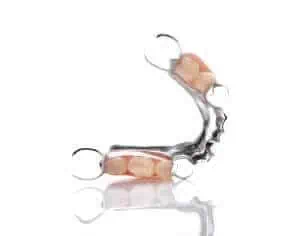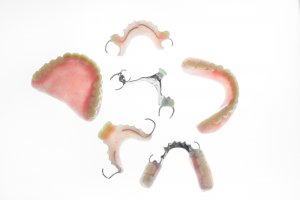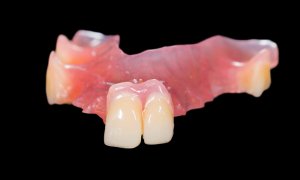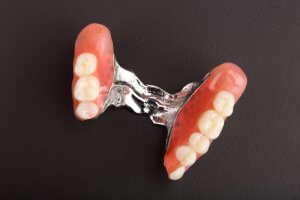What do partial dentures cost in the UK? It’s a good question if you’re missing one or more teeth and are looking for the best way to replace them. Partial dentures for front teeth can give you more confidence with your smile, while dentures for back teeth will help you eat properly and prevent damage to your other teeth.
You might already know that there are various types of partial denture, and they can be made from acrylic, metal, or a flexible material. Each has its own pros and cons, so it’s good to research your false teeth options before deciding which one to go for.

If you’re worried about the cost, the good news is you can get partial dentures on the NHS. Your choice of materials will be limited, though.
To help you understand your options for removable partials, and how to care for them when you do get them, this article is going to cover:
- What partial dentures cost in the UK, including on the NHS
- The types and materials available
- How to clean and care for partial dentures
- Tips for adjusting to wearing them
So keep reading to find out all you need to know about this tooth replacement option.
What are partial dentures?
Dentures – or false teeth – are one way to replace missing teeth. People who are missing all their teeth will need a full denture, whereas a partial denture is for people who are missing one or more teeth but still have some natural teeth remaining. The partial denture clips around the remaining teeth, using them for support.
Partial dentures can be made from plastic or metal, and can be rigid or flexible. We’ll explain more about the different materials below. They are removable, unlike dental implants which are permanently screwed into the jaw bone.
What do partial dentures look like?

The false teeth used in dentures should look like your natural teeth, if they are made well and cared for properly. They are held in place by a plastic or metal frame, which sits over your gums. An upper partial denture may cover the roof of your mouth. Sometimes metal clasps hook around your natural teeth to hold the partial in place, and these may be visible when you talk or smile.
Each prosthesis is made individually for each patient, and therefore every partial denture looks slightly different to the next.
Who can get partial dentures?
Anyone who is missing some of their teeth, but not all of their teeth, is eligible for a partial denture. That means that you can get partial dentures for front teeth, partial dentures for back teeth, and both lower and upper partial dentures.
Many people wonder if you can get a partial denture for one tooth, and the answer is yes, a denture can be used for any number of missing teeth. A dental bridge for one or two missing teeth.
If you smoke or have gum disease then you may only be offered dentures, as opposed to implants. This is because implants have a much lower success rate among people who smoke or have other oral health problems.
How long do they last?
Partial dentures undergo lots of wear and tear, and no matter how good they are, they aren’t going to be as strong as implants or normal teeth. Your dentures might crack, stain, or erode, requiring repair or replacement. Another thing that can happen is that your mouth naturally changes shape as you age, and bone loss can occur when you have missing teeth.
Over time, your partial denture may start to feel loose or uncomfortable. A denture reline maybe able to resolve the problem for a while, but eventually you will need a replacement. That being said, with the proper care, they should last 5 years or more.
Types of partial dentures
There is more than just one type of partial denture; in fact, there are plastic, metal and flexible partial dentures. The material used affects how much partial dentures cost: flexible tend to be the most expensive, and plastic the cheapest. Comfort and aesthetics also come into play when deciding which type is right for you.
Since every mouth is different, your dentist will be able to discuss your options and advise you on the best solution.
Let’s look a little more at the different types of partial false teeth available.
Acrylic partial dentures

An acrylic (or plastic) removable partial denture has a plate that is made from hard plastic, with the false teeth set into the base. They may or may not also have metal clasps to help keep them in place (they are classed as acrylic even if they have a small amount of metal for this purpose).
Acrylic partials can be adjusted and relined relatively easily, and are also typically the cheapest type of denture, although premium options are available at higher prices. If you need an immediate temporary denture after an extraction, you’ll probably get this type.
On the downside, they can feel quite bulky in the mouth because the acrylic has to be a certain thickness to make it strong enough.
Metal removable partial dentures

This type of partial consists of a cobalt and chromium frame covered by a gum-coloured synthetic material. The outward appearance is much the same as an acrylic frame, but the metal makes the denture stronger. Chrome can also be cast much thinner than acrylic, making it more comfortable to wear.
The cost of metal partial dentures in the UK is higher than basic acrylic ones, but it can be worth the investment since they should last longer if you take good care of them.
If you have just had teeth removed or have periodontal disease, this type may not be advised since it is harder to modify if your gums and mouth change shape.
Flexible dentures
Flexible partial dentures are a good option for those who are allergic to acrylic, or experience discomfort from the typical plastic or cast metal partial dentures. These flexible partial false teeth are made from a very thin plastic that is actually bendy, as you can see in the video below. They usually have gum-coloured clasps that fit around your natural teeth. One of the more well-known types of partial flexible dentures is a Valplast denture.
Flexible partial dentures cost more than traditional types, but they do carry some significant advantages:
- Long-lasting
- Soft and comfortable
- No metal clasps
- Translucent material looks natural against gums
- Lightweight
Read more about flexible dentures like Valplast in our separate guide.
How much do partial dentures cost in the UK?
The price of partial dentures will vary from patient to patient, depending on the number of teeth that need to be replaced, the materials used, and whether you use an NHS or private dentist. If you have dental insurance, you’ll probably find that it covers dentures (partial or full) to some extent. Check your policy to see whether you’re covered for NHS or private treatment, and what your limits are.
Can you get partial dentures on the NHS?
Yes, dentures are widely offered on the NHS for patients who have one or more teeth missing.
What do partial dentures cost on the NHS? In England and Wales you’ll pay the Band 3 treatment charge; currently £282.80 and £203.00, respectively. In Scotland and Northern Ireland, you’ll pay 80% of the treatment cost up to a maximum of £384. View our article about NHS dental charges for full details.
Getting partial dentures on the NHS is the cheapest option in most cases. They are usually made from metal and/or acrylic, but your dentist will discuss your options. You won’t get the same amount of choice as you would if you paid privately, though. NHS dentures might be made from cheaper materials, meaning they don’t look quite as natural as more premium options. They can also be more prone to breaking since the materials are lower quality. Therefore, some people choose to pay the extra for private treatment in return for better aesthetics, durability or comfort.
How much does a partial denture cost privately?

Partial dentures can cost anywhere from £250 up to £2,000 privately. Why the huge variation in price? It’s heavily dependent on the materials used and the amount of time it takes to make them. Many dental clinics offer a sliding price scale which increases according to:
- The number of teeth being replaced
- The position/alignment of the remaining teeth
- How natural the artificial teeth will look
- The strength and durability of the materials used
- The extent to which the tooth shape and colour can be customised
- How much time the dental technician will put into crafting partials that really suit your smile
The table below gives an idea of what each type of partial denture costs in the UK with a private dentist.
Type of denture | Approximate cost | Pros and Cons |
Acrylic (basic) | £250 - £600 | Affordable; might not look so natural; may break easily |
Acrylic (mid-range) | £500 - £1,000 | Better aesthetics; more durable |
Acrylic (premium) | £800 - £2,000 | Premium materials and optimal attention paid to look & fit |
Metal (chrome) based | £600 - £1,500 | Lightweight and durable |
Flexible (e.g. Valplast) | £450 - £1,500 | Comfortable and natural-looking, limited number of teeth |
As you can see, acrylic partial teeth are the cheapest – but also the most expensive if you choose a premium option. Flexible partial dentures cost more than basic acrylic partials but might be a more comfortable fit.
Getting used to your new teeth
It will feel strange at first having fake teeth in your mouth, but you should soon get used to them. If you have just had teeth extracted, your partials may feel uncomfortable while your gum is swollen and sore. It can take a week or so for it to feel normal again.
If you are worried about how your partial dentures fit – if they seem loose or keep slipping out of place – then your dentist can take a look and possibly make some small adjustments. You might also want to try a denture adhesive which will help hold them more firmly.
The video below shows one patient’s reaction after just a few hours of wearing a new acrylic upper partial denture. You wouldn’t know which teeth it was replacing until he removes it!
He mentions maybe going abroad to get implants in the future, since the cost in the UK is so high. If that’s something you’re interested in, you can read more about dental tourism in our full guide.
Eating with a partial denture
Your partial dentures are designed so that you don’t have to take them out when you’re eating. They stay in place using suction around your gums and palate, as well as perhaps clips around your teeth. Even so, you should avoid eating foods that are particularly sticky or hard, so as not to damage them or pull them out of place.
Getting used to partial dentures may take a little while, especially when it comes to eating. Start with soft foods cut into small pieces, and in no time you’ll find it’s much easier to eat with false teeth than with missing teeth. Your dentist will also give you instructions for proper care.
How to clean partial dentures
You can clean partial dentures in much the same way as you would full dentures. You should follow your dentist’s instructions since different materials require different care. There is also some useful information from the Oral Health Foundation here.
To clean plaque off partial dentures, use a special denture brush and soak them in a denture cleaning solution regularly.
Regular cleaning and proper care is one of the best ways to ensure your partials last as long as possible. It’s a good idea to clean them over a towel so that if you accidentally drop them, they are less likely to be damaged.
Patients missing one or more teeth may be interested in learning about the benefits of partial dentures. Missing teeth cause the bite pressures to shift in your mouth. This shifting can cause the other teeth to compensate for the “gap” in your bite. Following this, you may experience shrinking of both the soft tissues and the supporting bone close to your missing teeth. This can affect your physical appearance and can lead to more problems with your other teeth.
A partial denture keeps the underlying structures of your mouth – your gums, jawbone, facial muscles, etc. – engaged and active. Prevent further shifting of the other teeth in your mouth, and enjoy the confidence of having a beautiful, complete smile with partial dentures.
Dr. Kevin Varley, Stonebrook Family Dentistry
Conclusion
If you have missing teeth, it’s important to get them replaced, and not just for aesthetic reasons but for your health as well. If you go a long time without replacing your teeth, your jaw bone can begin to deteriorate and your other teeth might move into the empty space.
Dentures can’t do much for bone loss (you’ll need implants for that) but they can stop your other teeth from moving around, and they can help keep your facial muscles from sinking inwards.

You’ll also have an easier time chewing and eating a wide variety of nutritious foods, and talking will be easier too. Not to mention you’ll get to leave behind any self-consciousness you may experience as a result of having gaps in your smile.
So, we hope this article has filled you in on what exactly a partial denture is, and how much you might have to pay, so you can make the best decision about your dental restoration.
FAQs
What’s the best material for partial dentures?
The best material for you depends on your particular situation and the aesthetics you want to achieve. Metal is generally more durable than plastic, and it is also more expensive. However, it isn’t the best material for those with periodontal disease, because if you have gum disease, the shape of your mouth will change more, and you’ll have to have your partial false tooth or teeth adjusted more often.
Acrylic partial dentures are easier to modify than metal dentures. However, some people may be allergic to the plastic, in which case flexible materials might be a good alternative. Your dentist will help you decide which is the best material for you, considering aesthetics and cost.
Can I get an upper partial denture?
Yes. You can get a partial denture for any of your missing teeth, as long as you aren’t missing all of your teeth. Both rigid and flexible partials are available in the UK.
Where can I find cheap partial dentures?
NHS partial dentures should be offered to anyone who is eligible for NHS care in the UK. Private dentists can also provide affordable partial dentures. They may offer a better range of options. If you want a premium option at a lower price, consider travelling abroad.
Can I get a partial denture for one tooth?
Yes, absolutely. Partial dentures can be made to replace any number of missing teeth, although the more natural teeth you have, the more stable the partial is likely to be. If you are missing one tooth then a bridge or a tooth implant are also worth considering.
NCBI: Metal vs Acrylic Partial Removable Dentures for Patients with Periodontal Disease: A Review of the Clinical Effectiveness and Guidelines. Consulted 14th January 2020.
The Journal Of Prosthetic Dentistry: Removable partial dentures: The clinical need for innovation. Consulted 22nd June 2020.




